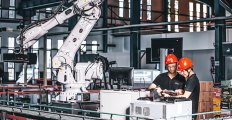In the evolving landscape of manufacturing, HR technology has emerged as a cornerstone for streamlining operations and enhancing workforce safety and compliance management. As the manufacturing industry continues to grow and adapt to new challenges, the integration of sophisticated HR tech solutions has become indispensable. According to a survey conducted by the Chartered Institute of Personnel and Development, 84.5% of the 1,174 HR leaders surveyed reported using HR systems, with some respondents hailing from the manufacturing sector.
HR technology encompasses a wide array of tools and systems designed to optimize and streamline human resource operations/functions. These range from recruitment and onboarding processes to performance management and employee engagement. However, one of the most critical areas where HR technology is making a significant impact is in workforce safety and compliance management.
Most of us knew that the manufacturing sector is inherently fraught with risks. Workers are often exposed to hazardous environments, heavy machinery, and stringent operational procedures. For example, on August 4, 2020, the city of Beirut was rocked by a cataclysmic event that will forever be etched in its history. A massive explosion, originating from a vast cache of ammonium nitrate, unleashed a devastating force that flattened Beirut and killed 200 people. Who manufactured the ammonium nitrate? No one knows, but it is clear that any manufacturing industry has safety and security issues.

HR Tech in Safety and Compliance Management
That being said, ensuring their safety is paramount, not only to comply with regulatory standards but also to foster a productive and motivated workforce. This is where HR technology steps in, offering innovative solutions to monitor, manage, and mitigate risks.
Advanced HR tech solutions, such as real-time monitoring systems, wearable devices, and predictive analytics, provide manufacturers with the tools needed to proactively address safety concerns. For instance, wearable devices can track workers’ movements and vital signs, alerting supervisors to potential hazards before they escalate into serious incidents. Real-time data analytics can identify patterns and trends, enabling companies to implement preventive measures and improve overall safety protocols.
Moreover, HR technology plays a crucial role in compliance management. The manufacturing industry is subject to a plethora of regulations and standards ranging from occupational safety and health to environmental guidelines. Non-compliance can result in hefty fines, legal repercussions, and damage to a company’s reputation. HR tech solutions streamline compliance processes by automating record-keeping, tracking regulatory changes, and ensuring that all employees are up-to-date with mandatory training and certifications.
Allow us to briefly explain each of them.
Enhancing Workforce Safety through Advanced HR Tech Solutions
Once again, in the manufacturing industry, ensuring workforce safety is not merely a regulatory requirement but a fundamental aspect of operational integrity and employee well-being. Advanced HR tech solutions are revolutionizing the way manufacturers approach safety, providing innovative tools and systems that significantly reduce risks and enhance the overall safety culture. Then, what kind of HR tech can be used here?
#1 Real-time monitoring system
One of the most impactful advancements in HR technology is the integration of real-time monitoring systems. These systems utilize a combination of sensors, like wearable devices, and IoT (Internet of Things) technology to continuously monitor workers’ environments and activities.
For instance, wearable devices equipped with GPS and health monitoring capabilities can track workers’ locations, detect falls, and monitor vital signs such as heart rate and body temperature. In the event of an anomaly, the system can immediately alert supervisors, enabling swift intervention to prevent accidents or health emergencies.
#2 Predictive analysis
Another significant application of HR tech in workforce safety is predictive analytics. By analyzing historical data and identifying patterns, predictive analytics can forecast potential safety hazards before they occur. For example, if data indicates a higher incidence of accidents in a particular area of the factory during specific times, management can proactively implement additional safety measures or adjust work schedules to mitigate risks. This proactive approach not only prevents incidents but also fosters a culture of continuous improvement in safety practices.
#3 Digital training platforms
Digital training platforms also play a crucial role in enhancing workforce safety. These platforms offer interactive and engaging training modules that are easily accessible to all employees. For example, virtual reality (VR) training simulations can immerse workers in realistic scenarios, allowing them to practice safety protocols and emergency responses in a controlled environment. This hands-on training method has proven to be more effective than traditional classroom-based training, as it enhances knowledge retention and ensures that employees are better prepared to handle real-life situations. For your information, VR-based training is 40% more effective than classroom-only training.
With that being said, advanced HR tech solutions are instrumental in fostering a safer working environment in the manufacturing sector. By leveraging real-time monitoring systems, predictive analytics, digital training platforms, and automated compliance management, manufacturers can significantly enhance workforce safety, reduce risks, and cultivate a robust safety culture. As the industry continues to evolve, the adoption of these state-of-the-art technologies will be essential in ensuring the well-being and productivity of the workforce.
Compliance Management: Leveraging HR Tech for Regulatory Adherence
In an era of stringent regulatory oversight, leveraging Human Resources (HR) technology for compliance management has become indispensable for organizations aiming to maintain regulatory adherence and operational integrity. The integration of advanced HR tech solutions offers a multifaceted approach to streamline compliance processes and mitigate risks. For example:
#1 Automated Compliance Management
HR technology facilitates the automation of compliance record-keeping and reporting, ensuring that compliance-related activities are documented and easily accessed. According to a survey by Deloitte, organizations using automated compliance management systems reported a 30% reduction in compliance-related errors, emphasizing the efficacy of technology in enhancing compliance.
#2 Employee Training and Certification
Compliance often facilitates regular employees with training and certification. HR tech platforms enable efficient scheduling, tracking, and documentation of training programs. For instance, a report by the Society for Human Resource Management (SHRM) highlights that companies utilizing HR tech for training saw a 25% increase in employee compliance rates, demonstrating the tangible benefits of technology in fostering a compliant workforce.
#3 Policy Management
HR technology streamlines the creation, distribution, and updating of organizational policies. Employees can access the latest policy versions, and automated notifications to ensure acknowledgment and understanding. A survey by PwC found that 60% of companies using HR tech for policy management experienced improved policy adherence, reflecting the crucial role of technology in maintaining regulatory compliance.
#4 Risk Management and Analytics
Advanced HR systems offer analytics and reporting tools to identify potential compliance risks proactively. By analyzing trends and patterns, organizations can address issues before they escalate. Research by Gartner indicates that predictive analytics in HR tech can reduce compliance risks by up to 40%, highlighting the strategic advantage of integrating technology in compliance management.
Future Trends in HR Tech: Forwarding the Manufacturing Industry
The manufacturing industry, a series of traditional practices, now, is undergoing a rapid transformation fueled by the rise of advanced HR technology. Emerging trends are poised to revolutionize workforce safety and compliance management, ushering in a new era of efficiency, agility, and proactive risk mitigation.
Artificial Intelligence (AI) and Machine Learning (ML)
AI and ML are set to revolutionize workforce safety by enabling predictive analytics. By analyzing historical data on accidents and near misses, AI algorithms can identify potential hazards and recommend preventative measures, reducing workplace risks. Furthermore, AI-powered chatbots can provide employees with instant access to safety information and resources, fostering a proactive safety culture.
Augmented Reality (AR) and Virtual Reality (VR)
AR and VR technologies are transforming training and development in manufacturing. Immersive simulations allow employees to experience real-world scenarios in a safe and controlled environment, enhancing their understanding of safety procedures and emergency response protocols. This immersive learning approach improves retention and reduces the risk of accidents.
Internet of Things (IoT) and Wearable Technology
IoT devices and wearable technology are transforming workplace safety monitoring. Real-time data on employee location, vital signs, and environmental conditions can be collected and analyzed to identify potential risks and trigger alerts. This proactive approach enables swift intervention and reduces the severity of workplace incidents.
Blockchain Technology
Blockchain technology is emerging as a powerful tool for secure data management and compliance. It can be used to create immutable records of employee training, certifications, and safety audits, ensuring transparency and accountability. This fosters trust and confidence among stakeholders, enhancing compliance and reducing the risk of legal disputes.
Cloud-Based HR Solutions
Cloud-based HR solutions are becoming increasingly popular due to their scalability and accessibility. These platforms allow manufacturers to manage HR processes remotely, ensuring continuity and compliance even in decentralized operations. Cloud solutions also facilitate real-time updates and collaboration, enhancing overall efficiency.
Advanced Training and Development Platforms
Innovative training and development platforms are leveraging virtual reality (VR) and augmented reality (AR) to provide immersive learning experiences. These technologies are particularly beneficial in manufacturing, where hands-on training is crucial. VR and AR can simulate real-world scenarios, helping employees gain practical skills while ensuring compliance with safety protocols.
Conclusion: Embrace the Future of HR Tech in Manufacturing
The integration of advanced HR technology in the manufacturing sector is not merely a trend but a necessity for ensuring workforce safety, compliance management, and overall operational efficiency. As the industry continues to evolve, the adoption of these cutting-edge solutions will be pivotal in navigating the complexities of the manufacturing environment and fostering a culture of safety and compliance.
Future Trends: AI, IoT, Blockchain, and Beyond
Looking ahead, emerging trends such as Artificial Intelligence (AI), Machine Learning (ML), Internet of Things (IoT), and blockchain technology are set to revolutionize workforce safety and compliance management. AI and ML will enable more sophisticated predictive analytics, identifying potential hazards and recommending preventive measures with greater accuracy. IoT devices and wearable technology will provide real-time data on employee location, vital signs, and environmental conditions, enabling swift intervention in case of anomalies. Blockchain technology will ensure the integrity and transparency of compliance records, fostering trust and confidence among stakeholders.
The Strategic Advantage of Cloud-Based Solutions
Cloud-based HR solutions offer unparalleled scalability and accessibility, allowing manufacturers to manage HR processes remotely and ensure continuity even in decentralized operations. These platforms facilitate real-time updates and collaboration, enhancing overall efficiency and operational resilience. As the manufacturing industry continues to embrace digital transformation, the strategic adoption of cloud-based HR solutions will be essential in maintaining a competitive edge.






















Leave a comment!